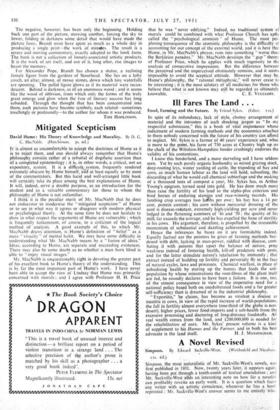Ill Fares The Land . . .
Food, Farming and the Future. By Friend Sykes. (Faber. 2 IS.) IN spite of its redundancy, lack of style, clumsy arrangement of material and the intrusion of such shocking jargon as "In rmy respectful submission," this is a book of vital impoaance whose indictment of modern farming methods and the economics attached to them nobody concerned with the future of his country can afford to neglect. Mr. Sykes is a farmer of 40 years' experience and, what is more to the point, his farm of 750 acres at Chantry high up on the chalk of the Wiltshire-Hampshire border crushingly endorses the validity of his contentions.
I know this borderland, and a more starveling soil I have seldom seen. Yet by such purely organic husbandry as mixed grazing stock, deep-rooting leys, winter yarding of cattle, the tripoding of hay and corn, as much human labour as the land will hold, subsoiling, the discarding of what he would call chemical subterfuge and the making of a thousand tons of compost a year, Mr. Sykes has, in Arthur Young's epigram, turned sand into gold. He has done much more than raise the fertility of his land to the alpha-plus criterion and bred horses of enduring stamina and race-winning records. His lambing crop averages two laiibs per ewe ; his hay has a 14 per cent. protein content ; his corn without mercurial dressing of the seed is disease-resistant, extremely high-yielding per acre and never lodged in the flattening summers of '46 and '50; the quality of his milk far exceeds the average, and he has expelled the bane of sterility in his cows. His argument, therefore, is propelled by the irresistible momentum of substantial and dazzling achievement. Hence the inferences he bases on it are formidable indeed. Equally factual are the pointers he gives of farming methods bur- dened with debt, lacking in man-power, riddled with disease, com- bating it with poisons that upset the balance of nature, prop weakness instead of fostering health, kill-off predators with pests, and for the latter stimulate nature's retaliation by immunity ; that extract instead of building up fertility and perversely fly in the face of natural cycles, laws and processes. Chemical warfare, in place of subsidising health by storing up the humus that feeds the soil- population by whose ministrations the root-fibres of the plant itself are fed, he roundly declares to have been a failure. It is one, too, of the utmost consequence in view of the imperative need for a national policy based both on_unadulterated foods and a far greater self-sufficiency than is dreamed of in the industrial philosophy. " Exportitis," he claims, has become as virulent a disease as mastitis in cows, in view of the rapid increase of world-populations,
the fall in fertility almost everywhere (one-third of the globe is how desert), higher prices, fewer food-imports and a sub-health -from the excessive processing and doctoring of long-distance foodstuffs. All real wealth comes from the land; and £200,000,000 is needed for the rehabilitation of ours. Mr. Sykes' present volume is a kind of supplement to his Humus and the Farmer, and in both his best


































 Previous page
Previous page